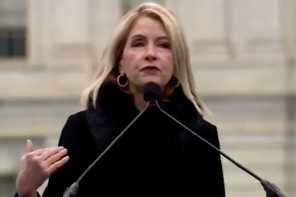A fascinating story was reported on the AP wires over the long holiday week-to-weekend. Apparently, a California physician, who is also an attorney, has renewed his legal challenge to the addition of the phrase, “so help me God,” to the presidential Oath of Office that President-elect Obama intends to swear, with his hand placed on a copy of the same Bible with which Abraham Lincoln swore a slightly different oath in 1861.
Dr. Michael Newdow argues that such public references to God are unconstitutional, signifying that non-theistic or atheistic citizens are not included in the same way (if at all) in the ceremonial inauguration of their new President. For similar reasons, Newdow is also suing to keep Reverend Rick Warren from delivering the prayer of invocation at the beginning of the ceremony. Newdow expressed his intention to file the suit on the last day of 2008 in a Washington, DC, District Court.
Newdow has done this all before, unsuccessfully, in anticipation of the Bush inaugurals in 2001 and 2005. Why, then, is he undertaking this thankless legal labor again? The short answer is because he is on strong constitutional footing when he does so. As I noted in a column in the summer of 2008, the US Constitution quotes precisely how the presidential Oath of Office is supposed to go, and it is studied in its avoidance of the rhetoric of religion. Article II, Section 1 of the US Constitution lays out exactly what oath the newly elected President is supposed to swear. It goes like this:
I do solemnly swear (or affirm) that I will faithfully execute the office of President of the United States, and will to the best of my ability preserve, protect, and defend the Constitution of the United States.
That’s all. No mention of “help” or of “God,” no mention of Christ, no reference to anything more than the individual presidential conscience. The power of such conscience, and the virtues this presupposes, were believed to be enough. In short, the Founders were as vigilant about keeping invocations of “God” out of our public civic discourse as the current fashion, in both parties, is to drag it in.
To be sure, presidential Inaugural Addresses were another matter. And while it took until 1821 before a US President dared utter the name of God in such an address, these references quickly became commonplace. But these are the personal expressions of the personal beliefs of a US President; they are not constitutionally mandated speech. Newdow is arguing that the constitutionally mandated language of an official oath may not be altered willy-nilly, according to the personal quirks of conscience, or of religious belief, of a particular presidential office-holder. If the Framers did not say “God,” then neither should a US President.
Why, then, am I not more enthusiastic about this threefold lawsuit? Because, as my title suggests, the political left needs to pick its battles very carefully right now. They have limited cultural and political capital and they must spend it wisely. You might have a case in suggesting that our money should not say “In God We Trust,” just as you may have a case if you object to the Oath of Allegiance’s Cold War invocation of (mono)theistic faith as a central tenet of US citizenship. But the cost of victory in such cases would be immense, and the Pyrrhic value of such victories almost non-existent.
In fact, I would prefer to see Newdow drop the suit about the Oath of Office altogether, decouple the question about the Oath and the presence of Rick Warren, and then to object to Warren’s seating on very different grounds. I worry that the Left that Newdow and his ilk represents is so fundamentally allergic to religious belief, and so theologically non-literate, that the only terms of debate they can imagine are religion versus no religion, and its implicit conception of the secular as a religion-free space. These are a winless propositions.
The real objections to Warren’s offering is theological, not secular. It is the (fire)brand of religion that he represents, and the not merely hawkish but reckless policies he cloaks in the Bible (and that I recently condemned in a column here) that should make a left-leaning Obama supporter, and Obama himself, blush. The man who argues that we should “take out” the Iranian president should not be involved in the swearing in of our own.
We have much to do and no time to waste. We must choose our battles, and the ground on which we choose to fight, carefully and in full recognition of the dangers before us. It is a time for deep reflection about words and their meaning. And we should choose our legal objection to such words with care.




